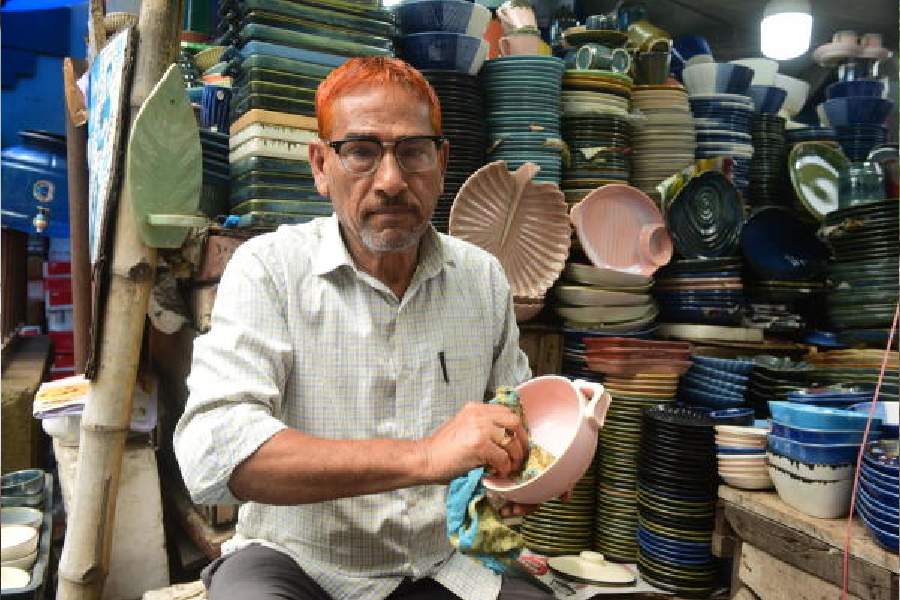An iridescent blue radiates from one end of Hindustan Road, from where you look up to the flyover.
It comes from the rows of ceramic items at a corner stall, which rises from the ground like a little pyramid, to quite a few feet, leaning backward but seemingly in defiance of both gravity and the unpredictable forces of a Kolkata street that can strike down anything in its way.
Some of the blue shades, or the shapes, are so exquisite that you are compelled to stand and stare. Gariahat stalls have a vitality that fills you with hope. But when I wander lonely as a cloud in Gariahat, sighting Muskan Crockery, for that is the name of the ceramic store, among an abundance of other tempting stalls is somewhat like the poet Wordsworth chancing upon daffodils amidst a heap of other most beauteous forms of nature.
The stall stands out, like the flowers. Only instead of yellow we have to make do with blue. But the rows of crockery at the stall, a popular destination, are not held together by chance alone.
Nashir Khan, 59, who is almost always at his post, looks after the stall with two other employees like him. A gentle man with pleasing manners, a weather-beaten face and a dab of henna in his hair, he treats every customer with care, bringing to their attention a new, interesting shape: a pizza dish, an asymmetrical, elegant plate, a flower vase with a giant belly and a slender neck or a brilliant blue dessert bowl.
Most of these are blue; some shot with green, some with brown, some with another blue, most richly textured, all quite resplendent. They are also extremely affordable.
“Ceramic is pure,” says Khan, a Kidderpore resident. He uses the Bengali word “shuddha”. Born in a Hindi-speaking family, he speaks fluent Bengali. “It is fired. You can do everything with ceramic. You can do puja, you can cook, you can use it in an OTG or in a microwave oven,” says Khan.
“We come here at 10 in the morning and when I reach home it’s 10 in the night,” says Khan. He and his colleagues come early to set up the stall every day. Plates are placed on top of other plates that rest on a series of large bowls.
“We take a look and know if something will hold or fall. And the rows behind are supported by planks,” he adds. He does not know why the crockery is predominantly blue. These are factory-surplus items from Ludhiana, Ambala and Ghaziabad, the reason they can be sold so cheap.
With restaurants and cafes booming in the city, the stall supplies crockery to many of these eateries. Khan, though he looks an integral part of the stall, has been working here only since 2016.
Once he was part of a very different world. Another blue had called out to him.
In 1978, when he was very young, he had joined the merchant navy. He had been able to because his two elder brothers were already working in merchant ships. Khan had not been able to complete school because of his circumstances.
Khan joined as a steward in Shipping Corporation of India (SCI).
“I have travelled all over the world,” he says, in a matter-of-fact tone. He would sail for the next four decades, mostly with SCI, in cargo ships. His very first voyage was to a port near Medina.
“My job always was to take care of the captain. Also look after guests in the ship.” He has been to many places in Asia, Europe and Africa. “I can’t remember all the names,” he says. But after thinking for a while, he says Istanbul is the most beautiful place he has visited. “It was exquisite,” he says.
He also remembers visiting an Israeli port, but cannot remember its name. He remembers the visit with great pleasure.
“I have been to China many times,” he says. He made several trips to the Andamans in passenger ships and and was on the Haji ship Akbari.
He had embraced the challenges of the sea. “At first you can vomit when the ship rolls. But then you begin to look forward to it as rolling makes you hungry,” laughs Khan.
The sea and the skies freed him, but so did the interior of the ship. “So many friendships with so many people from all over India. We were one. Religion, community, officers, crew made no difference. We ate together.” The water brought everyone together. Sailing out from Russia, on way to Africa, once Khan’s ship got caught in a cyclone.
“We had a very young captain, possibly from Dhanbad. He asked us to fasten the cargo, pipes, to the ship as much as possible,” says Khan. The ship was turned towards Singapore and everyone just hoped for the best. Khan loved all of it. “But at one point I saw only water.” A weariness crept into the soul.
He longed for land. So here he was, back on terra firma, in charge of beautiful things made of earth itself, but blue. Our lives are full of strange connections. Perhaps they are not strange. But how does he feel being fixed to a spot, after being on the move for years?
“I like it,” says Khan. “If I sat at home I would become inactive,” he says. He lives with his wife and son in the house in Kidderpore where he grew up. He has a son and daughter. The daughter, older, is married. The son is 21.
“But he is non-matriculate, like me. That is a problem,” says Khan. He has given me a lot of time, stepping away from his stall to a tea shop. He has to run now, with too many calls coming from the stall. Balancing fragile, beautiful things in rows may not be less difficult than keeping oneself upright on a rolling deck.
